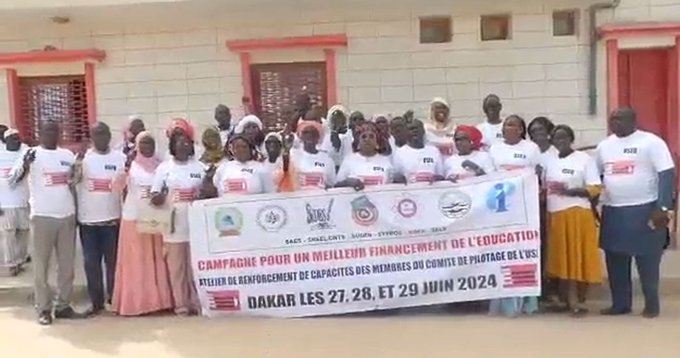Sénégal : Mobiliser pour un financement conséquent de l’éducation
« Mobiliser pour un financement conséquent de l’éducation ». C’est avec ce slogan que les membres du comité de pilotage de l’Union Syndicale pour une Éducation de Qualité (USEQ), qui regroupe les organisations membres de l’Internationale de l’Éducation (IE) dans ce pays, ont ouvert le séminaire pour un renforcement des capacités des enseignant∙e∙s syndicalistes.
Cet atelier, organisé du 27 au 29 juin à Dakar, et soutenu financièrement par le Fonds de solidarité de l’IE, visait à renforcer les capacités des membres pour identifier des solutions durables, notamment par des politiques fiscales appropriées. Il s'inscrit dans le cadre de la campagne pour un meilleur financement de l'éducation et réaliser l’Objectif de développement durable (ODD) 4 -l'éducation de qualité pour tou∙te∙s - d'ici 2030.
Un financement public insuffisant malgré des efforts notables
Au Sénégal, plus de 3 millions d'enfants ne vont pas à l'école publique, ou y vivent beaucoup de difficultés. Le manque de financement public pour l'éducation est donc un obstacle majeur.
Malgré des investissements significatifs, avec 7,23% du PIB et 29% du budget de fonctionnement alloués à l’éducation, le système éducatif sénégalais continue de faire face à des défis majeurs. Abdourahmane Gueye, secrétaire général de l’Union Démocratique des Enseignantes et des Enseignants du Sénégal (UDEN), souligne le paradoxe d’un financement qui dépasse les critères internationaux mais qui reste insuffisant pour répondre aux besoins des écoles publiques.
Les syndicats en première ligne pour une meilleure redistribution des ressources
Des syndicats, représentés par Malamine Biaye, secrétaire général du Syndicat National de l’Enseignement Elémentaire (SNEEL), et Hamidou Didhiou, secrétaire général du Syndicat des Enseignants Libres du Sénégal (SELS), ont insisté sur la nécessité de réfléchir à des solutions de financement endogènes et durables. Ils ont appelé à une meilleure redistribution des ressources pour améliorer les conditions de travail des enseignant∙e∙s et la qualité de l’éducation.
Des infrastructures scolaires en souffrance
Les témoignages d’enseignant∙e∙s, comme celui de Ndiak Bop, principal scolaire à Bambey et membre du Syndicat des Professeurs du Sénégal (SYPROS), ont mis en lumière les conditions précaires dans lesquelles évoluent de nombreux établissements. Avec des classes surchargées et des infrastructures insuffisantes, les syndicats plaident pour des investissements accrus afin de garantir un environnement d’apprentissage adéquat et inclusif.
Maïmouna Faye, professeure membre du Syndicat unitaire et démocratique des enseignants du Sénégal (SUDES), a aussi souligné les difficultés rencontrées au niveau du Brevet de sélection technique (BST) dans le secondaire, avec un manque criant de personnels éducatifs.
Dr. Seyni Ndoye, enseignant-chercheur membre du Syndicat Autonome de l’Enseignement Supérieur (SAES), a par ailleurs mentionné les difficultés budgétaires des universités qui affectent les enseignant∙e∙s-chercheur∙euse∙s.
Participation à la campagne « Pour le public : ensemble on fait école ! »
Le séminaire a permis de renforcer les capacités des responsables syndicaux∙ales sur l’importance d’un meilleur financement de l’enseignement public, et a réaffirmé leur volonté de rejoindre la campagne « La force du public : ensemble on fait école ! » de l’IE.
Les discussions ont également porté sur l’analyse de la politique fiscale et l’identification d’outils potentiels pour un financement domestique adéquat de l’enseignement public : partenariats public-privé, des réformes progressives sur la fiscalité, un financement participatif/solidaire mobilisant des fonds auprès de la communauté locale ou internationale, des taxes spéciales/fonds spéciaux, l'utilisation de la technologie, du digital et de l’intelligence pour une traçabilité et une transparence accrues du financement et la gestion des ressources allouées à l'éducation, ou le développement de partenariats avec des organisations internationales et des fondations philanthropiques. Les syndicalistes comptent désormais sur ces nouvelles compétences pour formuler des propositions concrètes aux décideur∙euse∙s politiques.
Un engagement renouvelé pour l’avenir de l’éducation
À travers cet atelier, les syndicats sénégalais de l’éducation ont manifesté leur engagement clair à œuvrer pour un financement public accru et durable de l’éducation. Ils entendent continuer à mobiliser et à sensibiliser les autorités et la communauté pour garantir une éducation de qualité pour tou∙te∙s les enfants du Sénégal.

[Thu, 05 Sep 2024 10:27:14 +0000] | DIGG THIS
Internationale de l’Education · No. 3 Torshie Close, Mempeasem · East Legon Extension · Accra · Ghana
Phone: +233.302.50.12.00 · Fax: +233.302.50.66.81 · Email: eirafoffice@ei-ie.org
Website Development and Design by Cyblance
